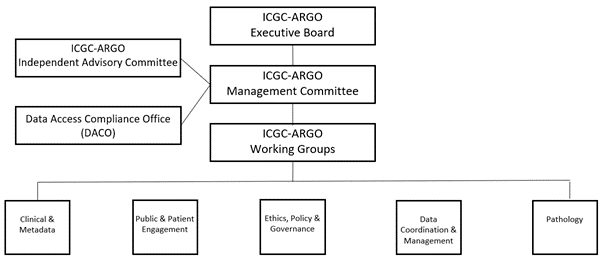D. Structure of ARGO
Version 3.3 February 2022
Download as pdf
The ICGC is a confederation of members that share the common goals and principles described in the policies and guidelines document and have agreed to work in a coordinated and collaborative manner within a defined structure. The members of the committees and working groups will help to provide clarity to the ICGC structure as it moves forward.

ICGC Executive Board
The Executive Board is the oversight and advocacy body with responsibility for upholding the goals and mission of ICGC ARGO. The Executive Board reviews the progress of ICGC ARGO and suggests actions to be taken to help ensure that ICGC ARGO follows its mission as outlined in this policy document, while allowing enough flexibility to adapt to the evolving landscape of research, clinical practice, technology advancements and patient engagement.
Specifically, the Executive will:
- Confirm nominations for new Members and member projects and programs
- Work closely with the Management Committee through the receipt and approval of activity reports and by responding to requests and providing comment and advice as appropriate
- Monitor progress, data quality, and data accessibility, including ongoing assessment of current projects and programs participating in ARGO and recommend appropriate actions to be taken
- Approve the recruitment of consultants or establish expert committees on issues related to science, law, intellectual property, ethics, funding, communications, etc
Members are nominated by ICGC ARGO member programs by jurisdiction and consist of individuals who possess expertise in areas related to the key aspects of ICGC ARGO. The Executive Board will have suitable jurisdictional representation relative to the composition of the ICGC, with approximately 10-15 members and terms in office of three years with the possibility of one renewal, if desired and agreed. A quorum of at least six people will be required to approve any decisions. The Board Chair is responsible for managing the board activities and liaising with the Management Committee. The Executive Director of the Management Committee will attend meetings as an ad-hoc member but without voting privileges. The Board will meet yearly at each annual scientific workshop.
Independent Advisory Committee
The Independent Advisory Committee (IAC) provides independent advice to ICGC ARGO on issues of a scientific or clinical nature, including those related to samples, ethics, data access and compliance, quality standards or evolving technologies. The IAC responds to requests from the Management Committee or the Executive Board to review and comment on reports on policies and processes. It can also request that the Management Team research specific issues that the IAC feel could have an impact on ICGC ARGO (e.g., potential changes in legislation or new technologies).
Members are nominated by the Management Team and approved by the Executive Board. Members have expertise in areas relevant to the goals of ICGC ARGO (e.g., clinical genomics, bioinformatics, patient advocacy and biomedical ethics and law.) The IAC numbers approximately 7-9 people; membership is for a three-year term with the possibility of one renewal if desired and agreed. Meetings are scheduled three times per year to a set agenda. Should a member miss three or more meetings in a row they will be deemed to have resigned from the committee. This group meets through video conference facilities, e-mail and in face-to-face meetings. A quorum of six people is required in order to approve any decisions. The IAC reports to the Management Committee. The Chair of the IAC is invited to attend Executive Board meetings as an ad-hoc member without voting privileges.
Management Committee
The Management Committee is responsible for carrying out the operations of ICGC ARGO. It is led by the ICGC ARGO Executive Director, situated at the University of Glasgow, Scotland and consists of Individuals from key scientific, clinical and management areas of the project. Members may also be strategically located in global regions where ICGC ARGO projects are concentrated. Meetings are scheduled monthly to a set agenda. Should a member miss three or more meetings in a row they will be deemed to have resigned from the committee. Membership may be reviewed on an annual basis upon advice from the Executive board.
Specifically, the management team will:
- Review expressions of interest for new member projects and programs
- Oversight and support of working groups; financial management and resource allocation
- Develop and manage academic, commercial and community partnerships to support the mission of ICGC ARGO
- Implement the communications strategy to assure active consultation with all ICGC ARGO stakeholders
- Engage industry partners
- Report to Executive Board quarterly with an activity report detailing progress against goals.
Governance of ICGC
The University as Data Controller (Regulation (EU) 2016/679 (General Data Protection Regulation) governs ICGC operations and management, including the Data Access Compliance Office and data processor such as the Data Coordination Centre and associated Regional Data Processing Centres. The duties of the processors are specified in a contract with the University of Glasgow as Data Controller.